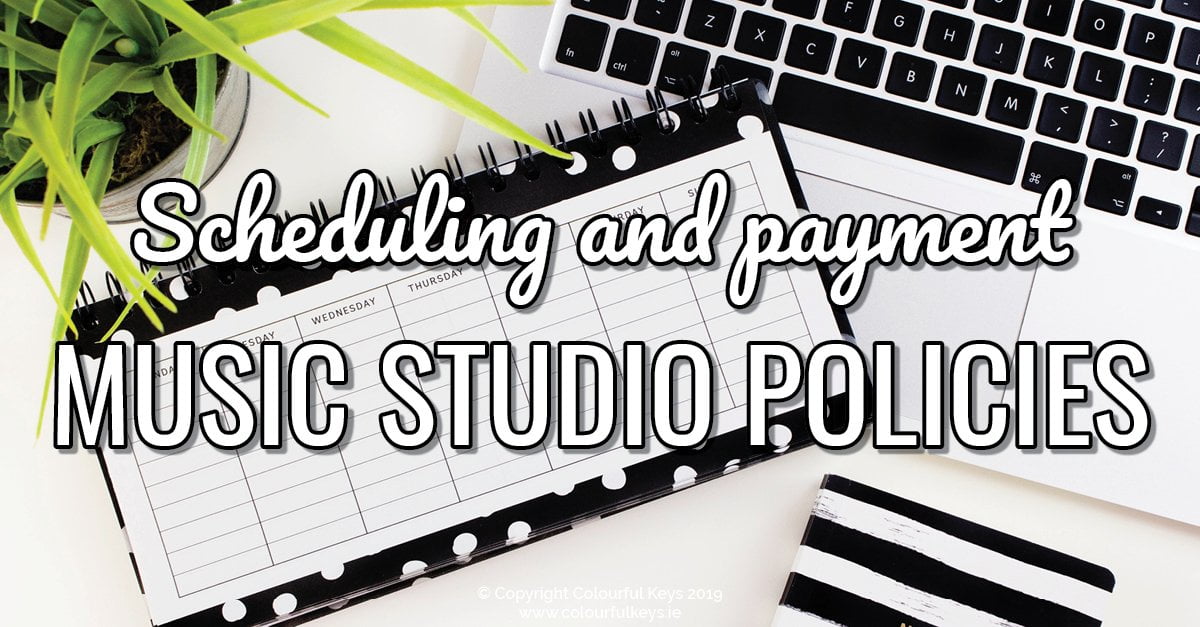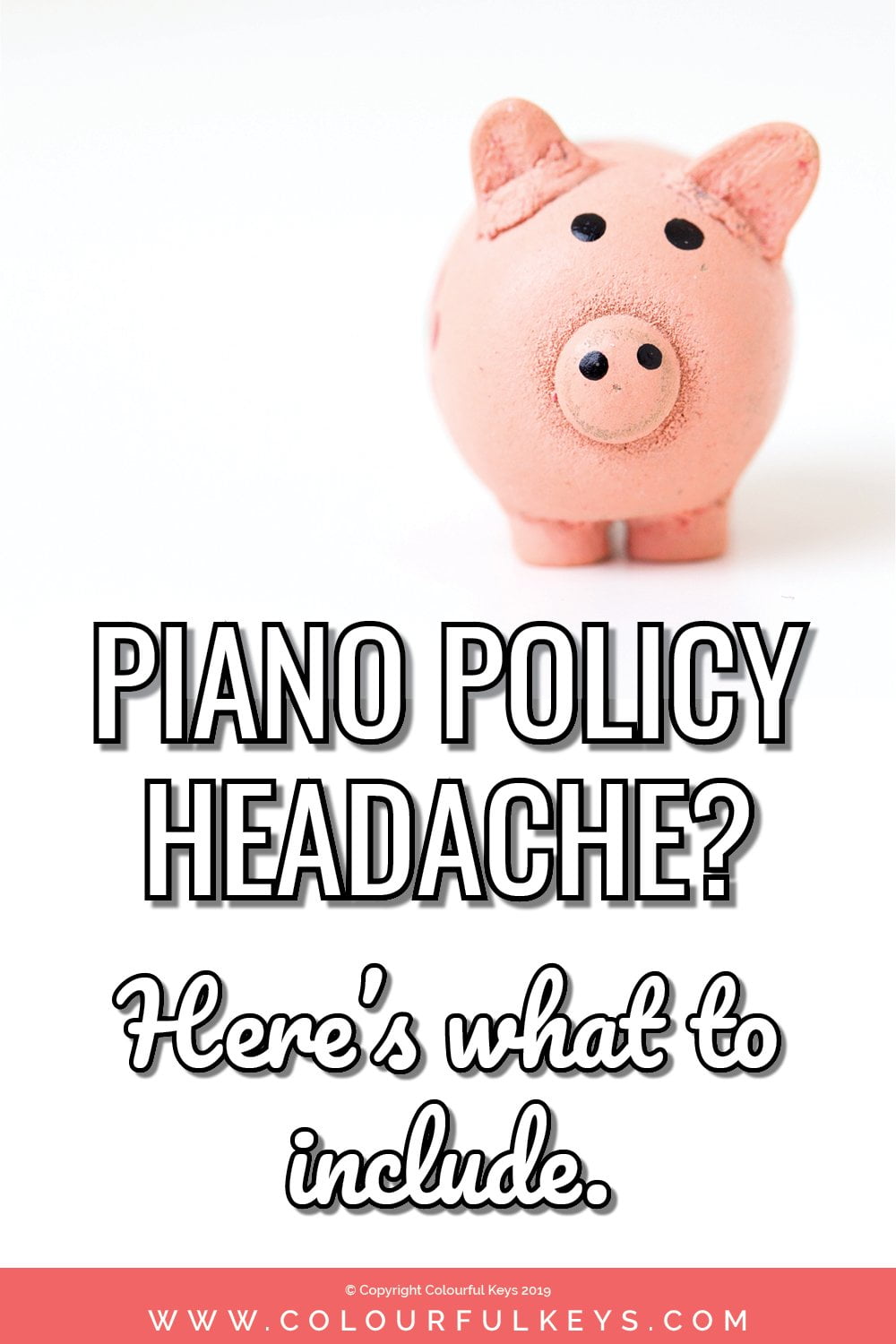Whether you’re in the beginning stages of setting up your piano teaching business or in your 20th year, it’s important to have clear piano studio policies that work for you and your business.

In this article, we’ll look at the most essential piano studio policies and how to decide the right ones for your business. First, though, I’d like to make two notes about your policies that I believe are even more important than the actual contents.
Important Note 1: One Page Policies
My policies fit on one page. No, not front and back, just one page.
I have seen many piano studio policies that span page after page (whether on-screen or on physical paper) and I do see how easy it is to let that happen. You may want to cover everything and be thorough, and things will creep in each year until you end up with monster policies that no one will ever read.
Try to trim them back.
Remember that your piano studio policies can’t do all the work. It’s not a legally binding contract and it can’t cover every eventuality. Think of your policies as easy to read and succinct guidelines for how your studio runs.
Oh, and I recommend bullet points instead of paragraphs. It will save space and you’ll tend to write more direct and clear sentences that way.
Important Note 2: Face-to-Face Communication
Don’t hide behind your piano studio policies. Good policies are not a way to get out of having difficult conversations, much as we all wish they could be.

Talk through your piano studio policies face-to-face when you meet with all new students and parents and communicate any changes clearly to returning clients.
Essential Piano Studio Policies
There are only two areas that I believe are absolute essentials for your piano studio policies: payments and attendance.
Payments policies for piano teachers
I recommend either monthly or semester-based fees for all teachers. Find out more about the ins and outs of payment structures in this article.

In terms of the wording on your piano studio policies about payments, you need to tell parents/students:
- When they need to pay you – e.g. first lesson of the month or before the semester begins
- How they should pay you – cheque, cash, bank transfer, credit card, etc.
- What will happen if they’re late paying you
That’s it. Just keep it simple, clear and straight-forward. (And remember those bullet points!)
Attendance Policies for Piano Teachers
This is split into three areas in my piano studio policies:
- Schedule
- I explain that they are committing to a certain spot and that we can’t guarantee a schedule change in the middle of the year.
- Missed Lessons
- I don’t do make-up lessons so in this section I explain the options they have available when they cannot make their lesson.
- I also explain here that I have allowed for one teacher absence in the fees and that the teacher can take this at any point during the year.
- Punctuality
- For travelling lessons this is especially important – how long will the teacher wait if no one answers the door?
- For lessons in a studio you simply need to explain that lessons will finish at the same time no matter what time they start.
Your policies may be different from mine of course. The most important thing is that they’re easy to follow and that they work for you. You’re the business owner.
Other Piano Studio Policies
There are various other things you might feel it’s important to include in your policies. Just keep in mind the one-page-rule and don’t overdo it!
Parking policies
Is parking a particular issue where you are? Perhaps you have restricted guest parking or particular areas that your neighbours want to keep clear? If so, put a note about this in your policies.
Holidays and Studio Breaks
I have a separate calendar so I don’t feel the need to include this, but if you don’t a simple list of the breaks and days off would be a good idea. (You’ll need to send reminders at the time too of course!)

Performances, Festivals and Exams
I would caution about including this unless you have a particular reason such as:
- Recital or festival participation is a requirement in your studio
- Fees for exams are included/extra expenses for your piano parents
If you’re tempted to put in more general information about your concerts and events, don’t. That’s too fluffy for your piano studio policies and would fit much better in a newsletter or brochure.
What do you put in your piano studio policies?
Do you think I’ve missed anything? Let me know in the comments. 🙂

I’ve actually been thinking about another attendance issue recently, and this might be more specific to me, but I’m noticing an ever increasing number of families who take extended holidays overseas every year. This year already I’ve had four families who have missed a month or more because they go overseas to visit family. Their children often go to school while they’re there and may even have music lessons, so I think, in their minds, it’s not a holiday per se, but an educational experience, etc. But my problem is that they expect not to have to pay anything for the lessons they’re not having here because they’ve given me notice many months in advance, but expect their slot to be here when they get back. But the thing is, of course, advance notice doesn’t really change anything. I can’t actually schedule anything in those spots if I’m required to have them available for these people when they return. This is starting to represent several thousand dollars of lost income, and I’m wondering if other teachers have this problem and what they do? Am I supposed to suck this up as part of the nature of the job? Am I entitled to expect payment for a full term regardless of attendance? One parent suggested I charge a “holding fee” of around half the regular lesson price. That’s better than nothing, but it’s still a loss of income for me, for no fault of my own. I used to have just one family who would return to Germany for two months of every year, and I could afford to be generous, but now that it’s getting up to about a third of my studio, I’m really noticing the impact. I’m interested in hearing your responses and suggestions lovely teachers!
Hi,
I’ve recently set out in my intro letter that I am unable to hold a lesson slot for any students if they take a break for longer than 4 weeks.
Before I put it in my letter I just told students, who for example we’re away for the summer break, that I couldn’t afford to hold their slot open for them.
Everyone’s always understood.
Good luck!
I wrote about this too recently here: https://colourfulkeys.ie/how-to-handle-summer-in-your-music-studio-business/
It’s so different in each community but I hope you find some clarity there. 🙂
Hi there,
What about student/parent discontinuing the lessons for a few weeks or a month due to financial crises? how to handle such situations? do we let them go away and come back later? in my situation I usually let them pay me later but that doesn’t fit me well and somehow I find this very unprofessional, whereas I don’t even charge any registration fees. I would appreciate your enlightning.
Hi!
I am a piano teacher in Texas. The hardest thing about teaching is getting the students to practice. Out of 30 students I may have two or three that regularly practice between lessons. I’ve tried everything I can think of and even had on the enrollment sheet for parents to say yes or no if they will remind their student to practice. of course everybody says yes and nothing changes.
I see other teachers with strict policies, but I’m still wondering how in the world do they deal with students that will not practice. they have keyboards and pianos and still refuse to practice. this is getting really really old! I thought about making them work on music theory worksheets during lesson time if they had not practice their songs in prepare them for the lesson. I’m thinking maybe the parents will get tired of them only doing worksheets and start making them practice like they’re supposed to. Any advice here would be greatly appreciated! Thanks!
Some students just wont practice, some students lack motivation and support, maybe the pieces are too easy or too hard or even boring to them. You should investigate and find what could be the reason. Start by talking and asking it to the student. For younger students talking to the parents and suggesting some practice schedule will help.